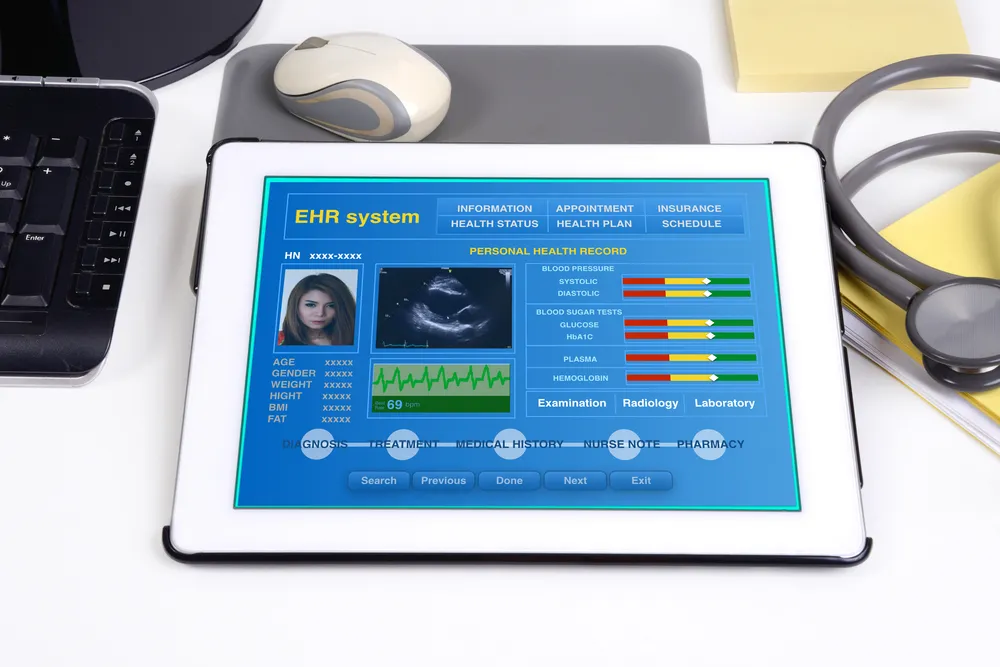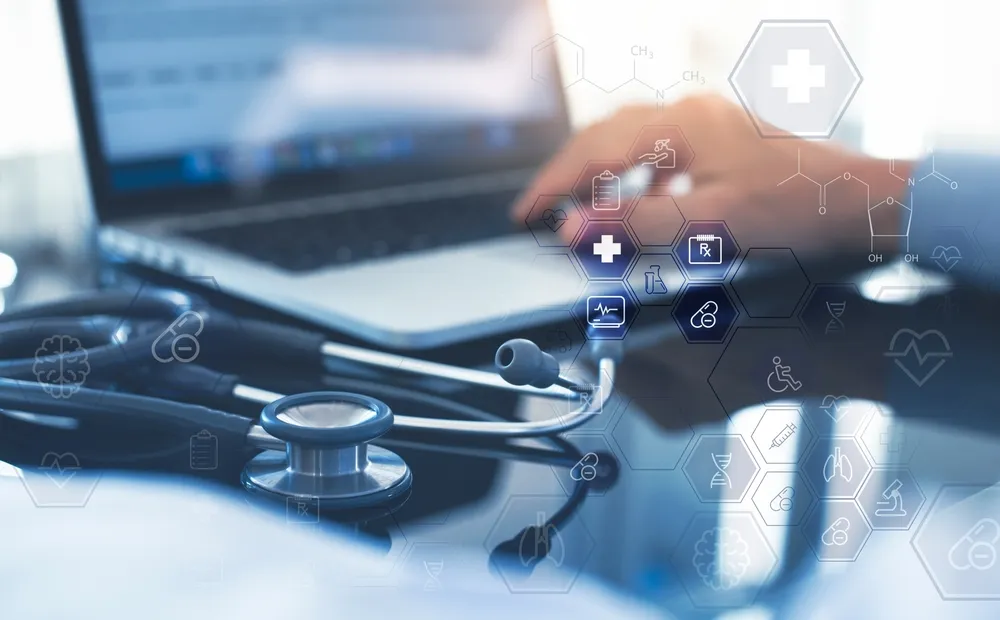From cameras to alarm clocks and phone books, everything you need is now on your smartphone. That’s because convenience is all that matters in the modern world. So why should managing your practice be any different?...
Have you ever wondered how much the United States invests in the healthcare of its citizens? If your guess hovered around a few hundred billion US dollars, think much higher. In 2023, the cost of healthcare in the United States has surged to an astonishing $4.7 trillion. Such an immense expenditure on healthcare underscores the crucial need for efficient revenue cycle management services to prevent revenue losses within healthcare setups.
Given the projected healthcare cost in the United States, which is expected to reach a staggering $7.2 trillion by 2031, the significance of efficient revenue cycle management cannot be overstated. Now, one way to ensure efficient revenue cycle management is to shift from outdated manual workflows to IT-based solutions. Therefore, EHR software, offering revenue cycle management services, stands as a perfect tool to avoid revenue loss.
Here, we discuss how healthcare setups can optimize their revenue cycle management (RCM) by incorporating IT-based solutions like EHR software.

What is Revenue Cycle Management?
Revenue cycle management is the process of collecting revenue for the services provided and tracking claims. RCM is a crucial component of the healthcare financial landscape. It encompasses a series of interconnected administrative activities that commence when a patient walks into the healthcare setup, be it a hospital, clinic, or medical practice. At its core, RCM is about ensuring that healthcare providers receive rightful payments for their services, navigating a complex web of patient interactions and insurance processes.
How Does Revenue Cycle Management Work?
The typical journey of RCM can be described in several stages, with variations in depth and sub-processes, but they share common foundational components. RCM primarily encompasses patient scheduling, registration, clinical encounters and documentation, medical charge coding, billing, payment posting, and late revenue recovery.
The revenue cycle kicks off with patient scheduling and registration, the initial steps in the process. During scheduling, patients book appointments, and their information is recorded. Registration involves collecting essential patient data, including demographics and insurance details. These initial stages lay the groundwork for effective RCM, as accurate patient information is vital for later billing and claim submission.
Clinical encounters and documentation represent the core of healthcare services, where patients receive care and providers document the services rendered. This phase is where medical professionals diagnose, treat, and prescribe, while accurate documentation becomes crucial for coding and billing procedures.
The subsequent steps involve medical charge coding, charge billing, and payment posting. Medical charge coding ensures that all provided services are properly categorized with corresponding codes. Moreover, charge billing involves generating and sending bills to patients and insurance companies. Lastly, payment posting, the final step, is where incoming payments are recorded.
Additionally, revenue management cycle services also include late revenue recovery efforts aimed at reclaiming outstanding payments and resolving any issues related to denied claims, underpayments, or non-payments. Thus, RCM plays an integral role in healthcare finance, ensuring the revenue stream remains consistent. In short, effective RCM practices are indispensable in navigating the complexities of modern healthcare economics.

How Does Technology Help Optimize Revenue Cycle Management?
Technology is pivotal in optimizing Revenue Cycle Management (RCM), allowing healthcare organizations to streamline and enhance their financial processes. The merge of technology with RCM brings about real-time efficiency and connectivity, revolutionizing how healthcare providers manage their revenue.
At the heart of modern RCM, a diverse array of technologies come into play. These technologies span from basic tools like Excel spreadsheets to highly sophisticated solutions like enterprise content management (ECM) and business process management (BPM) software. This technological ecosystem acts as a dynamic bridge that links various components of the revenue cycle, ensuring smooth and efficient data flow.
The technical complexity of RCM is evident in the multitude of tasks it encompasses. From verifying patient identities and insurance eligibility to collecting co-pays and accurately coding charges, technology plays an integral role in each step.
Moreover, coding, a critical aspect of the process, is intricate and demands significant investments in technology and staff training. Thus, it poses challenges for healthcare providers, especially those with limited financial resources. The rate at which a healthcare organization can collect revenue directly influences its overall performance and potential for growth. IT-based solutions, like EHR software, act as a catalyst in this regard, expediting the revenue cycle and ensuring a steady stream of funds vital for sustaining operations and expanding the organization.
Here is how a research study proposed technology can help optimize revenue cycle management services.
1. IT-enabled Coding Optimizes RCM by Reducing Errors
Leveraging Information Technology (IT) for coding, like EHR software, is a crucial element in optimizing revenue cycle management. That’s because coding accuracy is paramount in ensuring that healthcare providers are fairly compensated for their services. IT-enabled coding solutions have the potential to reduce errors and streamline the entire RCM process significantly.
With traditional, manual coding methods, the chances of human errors, omissions, and inconsistencies are relatively high. These errors can lead to claim denials, delayed reimbursements, and lost revenue. However, IT-enabled coding tools offer a level of accuracy and consistency that human coders may struggle to achieve.
By employing automated coding solutions, healthcare organizations can minimize coding errors and ensure that all provided services are accurately represented in the billing process. Thus, it not only speeds up revenue collection but also improves the overall efficiency of the RCM workflow.
2. EHR Software Improves RCM With Accurate Documentation
Electronic Health Record (EHR) software provides efficient revenue cycle management services by ensuring the accuracy and completeness of medical documentation. Accurate documentation is not only essential for delivering quality patient care but also for securing appropriate reimbursement.
EHR software, like Practice EHR, enables healthcare providers to create detailed, precise, and compliant clinical documentation. This includes capturing patient histories, exam findings, treatment plans, and diagnostic data in a structured and standardized format. Moreover, precise documentation is critical for justifying the medical necessity of services and treatments provided to patients.
By integrating EHR software into their workflow, healthcare organizations can streamline the documentation process, reduce errors, and enhance the overall quality of medical records. Additionally, EHRs facilitate the coding and billing processes by providing coders with comprehensive and accurate data, resulting in faster claims processing and reimbursement.
3. IT-enabled Revenue Cycle Management Services Boost Cash Flow
One of the key benefits of IT-enabled RCM services is the acceleration of the revenue collection cycle. By automating and streamlining various administrative and financial tasks, these services help healthcare setups expedite claims processing and secure timely reimbursements. Moreover, with reduced administrative burdens and faster claims submission, providers can significantly enhance their cash flow.
Furthermore, IT-enabled RCM services facilitate efficient patient billing and payment processing. They enable patients to receive clear and easily understandable statements, thus encouraging prompt settlements of their bills. Additionally, with user-friendly patient portals and electronic invoicing, patients can conveniently manage their financial obligations, further contributing to improved cash flow for healthcare providers.
IT-driven RCM services also enhance financial forecasting and reporting. By generating real-time analytics and performance insights, healthcare setups gain a comprehensive view of their revenue cycle. This data-driven approach allows for proactive decision-making and adjustments to improve financial outcomes.
Practice EHR - ONE That Offers Effective RCM Services!
Practice EHR ensures efficient revenue cycle management and increased cash flow with its unwavering commitment to making the best use of technology. Moreover, Practice EHR’s cloud-based EHR software gives healthcare providers convenient access to medical records on the go. Furthermore, Practice EHR automates the medical coding and billing process while ensuring data accuracy to eliminate claim denials and returns.
Say goodbye to pending claims and revenue loss by onboarding the industry leader to take care of your practice’s Revenue Cycle Management (RCM). REQUESTING A DEMO is just one click away!
Topics: Patient Care, EHR Solution, digital age, Revenue Cycle Management, EMR, Medical billing services, RCM, EHR
RECENT POSTS



TOPICS
- EHR Solution (147)
- EHR (84)
- Patient Care (77)
- digital age (77)
- Medical Billing (72)
- Specialty-Specific EHR (70)
- Integrated EHR (59)
- Small Practice (56)
- Technology in Healthcare (55)
- Industry Update (50)
- New Technology (47)
- Medical billing services (45)
- RCM (43)
- EHR Features (42)
- Cloud-based EHR (39)
- Practice EHR News (39)
- Healthcare Office Management (37)
- Kiosk (28)
- ePrescribing (21)
- HIPAA Security (20)
- Telemedicine (14)
- EMR (12)
- Revenue Cycle Management (12)
- Practice Management Software (11)
- Client Favorites (10)
- Practice Automation (10)
- The ONE (10)
- Urgent Care (8)
- MACRA/MIPS (7)
- Patient Portal (7)
- Switching to New EHR (6)
- events (6)
- E-Prescribing (5)
- Product Updates (5)
- TeleVisit (5)
- AI Solutions (4)
- Insider (4)
- Internal Medicine EHR (4)
- MIPS (4)
- Podiatry (4)
- Podiatry EHR (4)
- AI Scribing (3)
- HIPAA (3)
- MIPS Reporting (3)
- Regulatory Updates (3)
- AI scanning (2)
- Billing for Private Practices (2)
- Clearinghouse (2)
- Dermatology EHR (2)
- EHR Scheduling (2)
- Foot and Ankle Care (2)
- Foot and Ankle EHR (2)
- Health records 101 (2)
- Integrated Practice Management (2)
- Medical Credentialing (2)
- Medical Practice Management Software (2)
- Orthopedics EHR (2)
- Patient Check-in Kiosk (2)
- Psychiatry EHR (2)
- Quality of Patient Care (2)
- Reporting Under MIPS (2)
- Risk and Liability in Medical Settings (2)
- Telehealth Platform (2)
- Telehealth Platforms (2)
- What Works Clearinghouse (2)
- AI-powered Medical Billing (1)
- Bariatric EHR (1)
- Behavioral Health Practices (1)
- Billing Communication (1)
- Cardiology EHR (1)
- Cash Flow (1)
- Chiropractic EHR (1)
- Data Security (1)
- Dos and Don'ts (1)
- EHR Guides (1)
- EHR KPIs (1)
- EHR Questions to Ask (1)
- EHR for Chiropractors (1)
- EHR for Chronic Illness (1)
- EMR vs EHR Difference (1)
- ENT EHR (1)
- Eligibility Verification in Medical Billing (1)
- Endocrinology EHR (1)
- Family Medicine (1)
- Family Medicine EHR (1)
- Gastroenterology (1)
- Gastroenterology EHR (1)
- General Surgery EHR (1)
- Geriatrics EHR (1)
- Guides (1)
- Healthcare Compliance Certification (1)
- Healthcare Practice Office Management (1)
- Help Center Videos (1)
- Insurance Reimbursement (1)
- KPI (1)
- Key Performance Indicators (1)
- Lab Processing (1)
- MACRA (1)
- Medical Billing Partner (1)
- Medical Coding Services (1)
- Mobile EHR (1)
- Nephrology EHR (1)
- Neurology EHR (1)
- Pain Management EHR (1)
- Pediatrics EHR (1)
- Physical Therapy EHR (1)
- Practice Cash Flow (1)
- PracticeEHR GO App (1)
- Pulmonology EHR (1)
- Simplify Practice Management (1)
- Staffing in Healthcare (1)
- Switch Medical Billing Providers (1)
- Urgent Care Medical Billing (1)
- Urology EHR (1)
- insurance claim denials (1)







